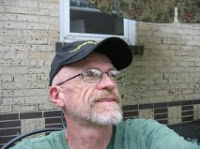 |
| Harry, John, and Pat ( Photo taken 1983 in L.A.) |
On first meeting Harry Hay and John Burnside at my home here in Denver back in 1978 one of the first of many teachings Harry attempted to impart to me was his theory of Subject-Subject consciousness. Specifically how this related to gay men but he could extrapolate to all queers when asked to elaborate. This form of consciousness was of course in opposition if you will to Subject-Object consciousness and the form of relating that invokes. This is what he considered to be the heterosexual male paradigm defining almost all of their interactions, an endless competitive game of domination and submission.
Basically Subject-Subject implies the ability to relate to another sentient being as someone equal with you and not as an object. This is something I have, with varying degrees of success, attempted to aspire to in my life certainly in personal friendships, with lovers and professionally. It is a simple idea really with rather profound implications for the human race. What sort of world would we have if we all looked on each other in a subject-subject manner as opposed to subject-object?
So why you may ask do queers have a leg up, as Hay theorized, with this subject-subject business as opposed to heterosexuals? I do think many heterosexuals do acquire this level of consciousness, but it doesn’t come quite as naturally to them as it does to us. Hay thought we had an innate tendency to this form of relating and that it first comes to fruition in our initial internal coming out process. Let me quote from Radically Gay (Roscoe,editor:1996) and a piece written by Hay in 1979: “I suppose I was about eleven when I began first thinking about, then fantasizing about, him! And, of course I perceived him as subject. I knew that all the other kids around me thought of girls as sex objects to be manipulated, to be lied to in order to get them to “give in” and to be otherwise (when the boys were together without them) treated with contempt. And strangely, the girls seemed to think of the boys as objects, too. But HE whom I would love would be another ME. We wouldn’t manipulate each other – we would share –and we would always understand each other completely and forever.” Harry could be quite the optimistic romantic.
Some might argue that subject-object relating is the natural course of evolution, the survival of the fittest. I think that this evolutionary critique can be debunked but I am way to lazy for that here. Let me just say that I do think humans are evolving, sadly probably not nearly fast enough for our eventual survival as a species, but at our most altruistic best we are moving slowly, kicking and screaming, towards a subject-subject form of relating to one another. I think an argument can be made we queers are in the vanguard of this evolutionary trend. A real test for us will be if we can bring this consciousness into the newly opened realms of marriage and military service. A daunting task since these are two institutions that are traditionally built on domination and submission.
Which brings me back to the topic of the day “competition”. I guess I view competition as perhaps the most odious form of Subject-Object intercourse. There has always got to be a looser. Nobody really believes the old adage “it not’s whether you win or loose but how you play the game’. Ask any Broncos fan.
Let me share with you an anecdote from my professional life in which I have strived, again not always successfully, to relate in a subject-subject manner. Unfortunately the doctor-patient and very much so even the nurse-patient relationship is one that is in our culture inherently subject-object. One small way I would try to counteract this imbalance was to never have the clients I was seeing be sitting on the exam table when I came in but rather in the chair next to the table so we could more easily relate eye-to-eye. Putting someone on an exam table and especially putting them there half naked, and perhaps leaving them for 20 minutes before you show up is a power move, a not so subtle game of domination and submission. This is even more daunting to do these days since many exam rooms have a computer screen on the table and the exam table behind that. Kaiser though I admit has addressed that somewhat and has moveable computer stations that do allow for more face-to-face contact, which is if you can get the provider to look at you and not the screen.
Let me close with a quote from my favorite nursing theorist, Margaret Newman, who was all about subject-subject relating when it came to the “nurse-client” relationship: “ The joy of nursing lies in being fully present with clients in the disorganization and uncertainty of their lives – an unconditional acceptance of the unpredictable, paradoxical nature of life.” I have no idea if she was a lesbian or not but I will apply my universal rule to her also and assume everyone is queer until I know otherwise. Certainly her strong nods to subject-subject consciousness and her noncompetitive approach to the nurse-client relationship give her a head start in the area.
March 2014
About the Author
I was born in La Porte, Indiana in 1949, raised on a farm and schooled by Holy Cross nuns. The bulk of my adult life, some 40 plus years, was spent in Denver, Colorado as a nurse, gardener and gay/AIDS activist. I have currently returned to Denver after an extended sabbatical in San Francisco, California.


